Group Urges Resources for Student-Athletes’ Safety and Wellbeing, Coaching Diversity
Figures Produced by the Knight Commission:
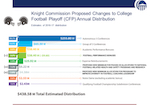 College Football Playoff Distribution and Knight Commission Proposed Changes to CFP Distribution College Football Playoff Distribution and Knight Commission Proposed Changes to CFP Distribution |
 Racial and Gender Diversity of Division I Football and Men’s and Women’s Basketball Racial and Gender Diversity of Division I Football and Men’s and Women’s Basketball |
Photos – Video (session 1) – Video (session 2)
CLICK HERE to see the listing of panelists, access briefing documents supplied by panelists, and access videos.
Washington, D.C. – The Knight Commission on Intercollegiate Athletics called for the College Football Playoff to invest some of its revenue for the first time in national initiatives supporting the health and safety of football players and in programs to increase diversity among football coaches. In addition, the Commission urged the College Football Playoff to follow the NCAA’s lead in adding current or former student-athletes to its board of managers.

College Football Playoff revenues are currently distributed back to schools that compete in the Football Bowl Subdivision (FBS). While some of these funds are used to support athletes’ education, including athletic scholarships and medical care and expenses at the campus level, the Commission believes a meaningful portion of CFP revenues should be used to bolster national initiatives critical to the future health of football.
“It’s time for the CFP to demonstrate national leadership on health and safety issues and to step up to address the shortage of diversity in coaching in FBS college football,” said Knight Commission co-chair Arne Duncan, former U.S. Secretary of Education.
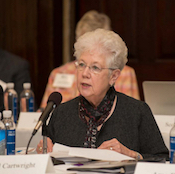
The Knight Commission recommended a new principle for the College Football Playoff to equalize payouts of academic and football performance bonuses. For starters, the Commission recommended the two pools of bonus money be the same. And during a phase-in period of multiple years, these bonuses should be equalized on a per-school basis. At present, football performance bonuses per school average $4.8 million compared to $300,000 per school for academic performance.
Conference commissioners, athletics directors, and other experts discussed these issues in panels before the Commission today.
The NCAA currently funds national health and safety initiatives, including those of special importance to football, such as national studies of concussions in college sports. The Pac-12 conference is the only FBS conference to set aside a portion of its CFP funds towards research that impacts athlete health and wellbeing.
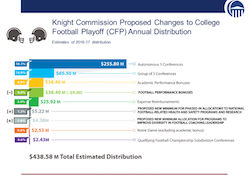 Health and safety concerns continue to be a top priority for college football. A recent rule change, effective this fall, will eliminate the preseason football tradition of two contact practices a day. Contact practices will be limited to one a day, with additional restrictions on other activities during the preseason. Also, under a proposed settlement of a class-action concussion lawsuit, the NCAA will spend $70 million to set up a medical monitoring program for current and former college athletes, and $5 million to research the prevention and treatment of concussions.
Health and safety concerns continue to be a top priority for college football. A recent rule change, effective this fall, will eliminate the preseason football tradition of two contact practices a day. Contact practices will be limited to one a day, with additional restrictions on other activities during the preseason. Also, under a proposed settlement of a class-action concussion lawsuit, the NCAA will spend $70 million to set up a medical monitoring program for current and former college athletes, and $5 million to research the prevention and treatment of concussions.
In other discussions, the Commission heard from experts about efforts to increase diversity among college sports leaders. Last season, nearly 60 percent of the football players competing in the FBS were persons of color, compared to 15 percent of the head coaches and 33 percent of the assistant coaches. (The FBS is the group of schools that compete for the College Football Playoff National Championship.)
The Commission released data that highlight the continuing lack of diversity in Division I football and men’s and women’s basketball. While there have been pockets of improvement, diversity among coaches hasn’t increased much since 2007-08, the earliest year with comparable data.
“As a starter – and as a bare minimum that would grow over time – the Knight Commission would like to see at least one penny of every dollar in CFP revenue allocated for programs to develop a deeper and more diverse talent pool in college football coaching,” said Duncan. “We would encourage presidents and athletics directors to seize the opportunity to boost diversity and make this a real priority.”
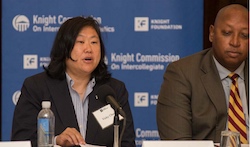
If the Commission’s recommendation had been in place last year, the CFP would have devoted $4.3 million to support diversity programs— the same amount that four schools alone paid in bonuses to their football coaches for their teams’ participation in the 2016 CFP games.
Last year, the NCAA spent under $200,000 on professional development programs for minority football coaches using its March Madness basketball tournament revenues.
Bob Bowlsby, commissioner of the Big 12 Conference and chair, NCAA Football Oversight Committee, said that the Big 12 recently discussed the NFL’s Rooney Rule, which requires teams to interview at least one minority candidate in a head coaching search. But he added, “In the end, it’s not about interviewing people of color, it’s about hiring people of color.”
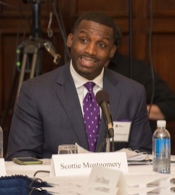
Scottie Montgomery, head football coach East Carolina University, supported implementing the Rooney Rule for college sports, because he said it’s important to get black coaches into the interview process.
The Knight Commission also called for the CFP to add current or former student-athletes to the College Football Playoff Board of Managers, as the NCAA Division I Board of Directors has done. This recommendation is in keeping with the Commission’s previous recommendation to add independent voices to the governing boards of college sports.
“It’s crucial that athletes have a voice in the oversight of the College Football Playoff,” said the Commission’s other co-chair, Carol Cartwright, president emeritus, Kent State University.
Finally, the Knight Commission was encouraged by NCAA actions last fall to include academic incentives in its annual revenue distribution and to reduce athletics time demands on college athletes consistent with the Commission’s prior recommendations.
The Commission also commended the NCAA’s one-time distribution of $200 million last month to college athletics departments, in amounts ranging from $165,000 to more than $1.3 million, with the proviso that the funds had to be used for “the direct benefit” of college athletes. At its meeting last spring, the Commission called on the NCAA to increase the “restricted uses” of the funding it provides to schools so that such funding is used solely for athletes’ education or their health and safety benefits and protections.
“We’re heartened by the NCAA’s action,” said co-chair Cartwright, “but we would like to see that practice become the norm.”
Today’s meeting was the first one led by Cartwright and Duncan since they became co-chairs at the beginning of the year. It was also the first meeting of new member Dr. Christopher Howard, president of Robert Morris University, and former football player at the Air Force Academy.
About the Knight Commission on Intercollegiate Athletics
The Knight Commission was formed by the John S. and James L. Knight Foundation in October 1989 to promote reforms that support and strengthen the educational mission of college sports. Over the years, the NCAA has adopted a number of the Commission’s recommendations, including the rule that requires teams to be on track to graduate at least 50 percent of their players to be eligible for postseason competition. The Commission’s Athletic and Academic Spending Database provides financial data for more than 220 public Division I institutions, creating greater financial transparency on athletics spending.
About the John S. and James L. Knight Foundation
The Knight Foundation supports transformational ideas that promote quality journalism, advance media innovation, engage communities, and foster the arts. We believe that democracy thrives when people and communities are informed and engaged. For more, visit www.knightfoundation.org.
Photos
